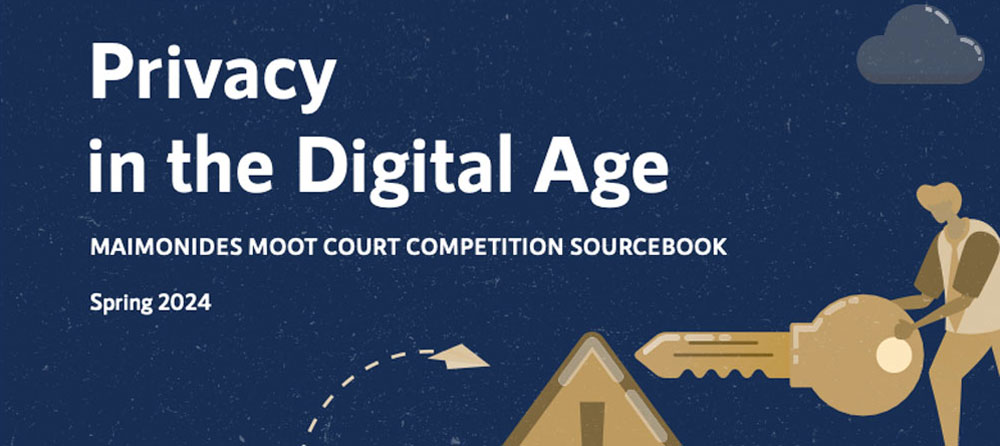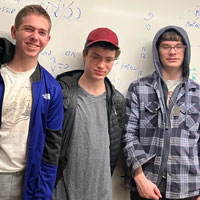Jewish learning Hebrew College Teen Beit Midrash To Tackle Data Privacy Issues at Moot Beit Din

What can centuries-old Jewish texts teach us about protecting our modern data?
For the first time, Hebrew College’s Teen Beit Midrash (TBM) is fielding a team for the 2024 Maimonides Moot Court High School Competition. The three-person TBM team joins teams from across North America and Israel preparing for this year’s case: Privacy in the Digital Age.
“We’re excited that this moot beit din gives us an opportunity to expand our TBM programming by offering a deep dive into Jewish texts and how they can be relevant to our lives today,” says Rabba Claudia Marbach, TBM director and teacher. “This case explores how traditional Jewish legal approaches to privacy can be applied to modern day social media platforms, especially around questions of data privacy. What better topic for these digital natives?”
A beit din is a Jewish court of law which makes rulings in accordance with halakhah by applying precedent to the particular circumstances of a case. Each year in the Maimonides Moot Court, high school teams spend months developing arguments in response to an ethical case using a curated sourcebook of Jewish texts that span the full breadth of Jewish tradition — ancient and medieval texts, juxtaposed with modern perspectives from our present moment.

Teams present and defend their arguments before a panel of judges who look for a well-constructed legal argument that brings the sources into conversation with each other. The experience fosters rigorous ethical debate rooted in Jewish legal wisdom and provides an international stage for students to engage with significant moral challenges.
Past cases have addressed issues such as tainted money, #MeToo, shaming on social media, criminal justice, medical ethics, and artificial intelligence. This year, teens are considering ethics around social media and privacy:
Social media networks argue that users are voluntarily using their platforms and consent to their privacy policies. But privacy advocates are especially concerned with the personal data that these companies collect from their users. That’s because apps such as Facebook, Instagram, and TikTok tend to collect a tremendous amount of data from their billions of users, while maintaining an unreliable track record of keeping this information safe. And at a time when social media has become intertwined with so many aspects of our lives, staying away is not always a realistic option.
This year’s case challenges you to address this concern and explore whether there should be limits in place regarding the types of data that social media platforms can collect, and for what purposes. You’ll be introduced to a variety of Jewish legal and ethical principles that have engaged questions surrounding privacy rights for thousands of years. We invite you to engage in the challenge of applying these ideas to the complex realities of the 21st century.1
The teens are asked to respond to this specific scenario:
The Glendale Beit Din is one of the groups that has been invited by iSocial to share feedback about its privacy policy. They have been asked to offer guidance about a halakhic approach to this situation. In particular, the beit din has been asked by iSocial whether it is halakhically permitted to:
- Collect data from posts on users’ profiles, and if it is dependent on whether the profile is listed as “public” or “private.”
- Collect data from the direct messages sent between users.
- Collect data about the precise location of its users.
- Share or sell user data that is collected to third party companies. 2
“I’m enjoying that this case can be examined through the lens of halakhah,” said TBM team member Sam Goykhman. “I think it’s really cool to connect text I’m familiar with to the real-world and issues that are relevant to us,” added his teammate, Adam Michael.
The Moot Beit Din, which is sponsored by the Hadar Institute and supported by Maimonides Fund, is preceded by a shabbaton. Because the weekend-long event attracts an international cohort, it’s a great opportunity for TBM team members to build community with like-minded Jewish teens.
“I hope the students will come away with a deeper understanding of the texts and how they can be used to inform how we think about issues that they care about,” said Marbach. “ And I look forward to the students connecting with Jewish teens from around the world.”
Special thanks to Harvey & Marsha Chasen, Edward and Barbara Scolnick, and Myra & Robert Snyder for being generous supporters and champions for Hebrew College teen programs.
1 2024 Cardozo Division Sourcebook
2 Ibid.

